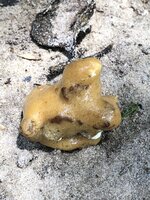We have 4 hens that just turned 4 years old. 2 are Rhode Island Reds and the other 2 are Easter Eggers. Recently, we noticed that one of the Easter Eggers was having some foamy, yellowish poop. We have seen it several times over the last week or so. She is acting fine, eating and drinking normally, but she hasn’t been laying, and she’s lost a few feathers. Not sure if she’s beginning to molt or what, which could explain the laying issue. All other hens are doing just fine.
I’ve done some research online, which seems to point to either intestinal parasites or a bacterial infection. Is there a way to tell for sure or treatments that we could try that wouldn’t hurt, or do we really need to find a vet that can do a test on the stool to make sure we administer appropriate treatment?
Here is a photo:

Thank you in advance for any advice!
I’ve done some research online, which seems to point to either intestinal parasites or a bacterial infection. Is there a way to tell for sure or treatments that we could try that wouldn’t hurt, or do we really need to find a vet that can do a test on the stool to make sure we administer appropriate treatment?
Here is a photo:

Thank you in advance for any advice!

